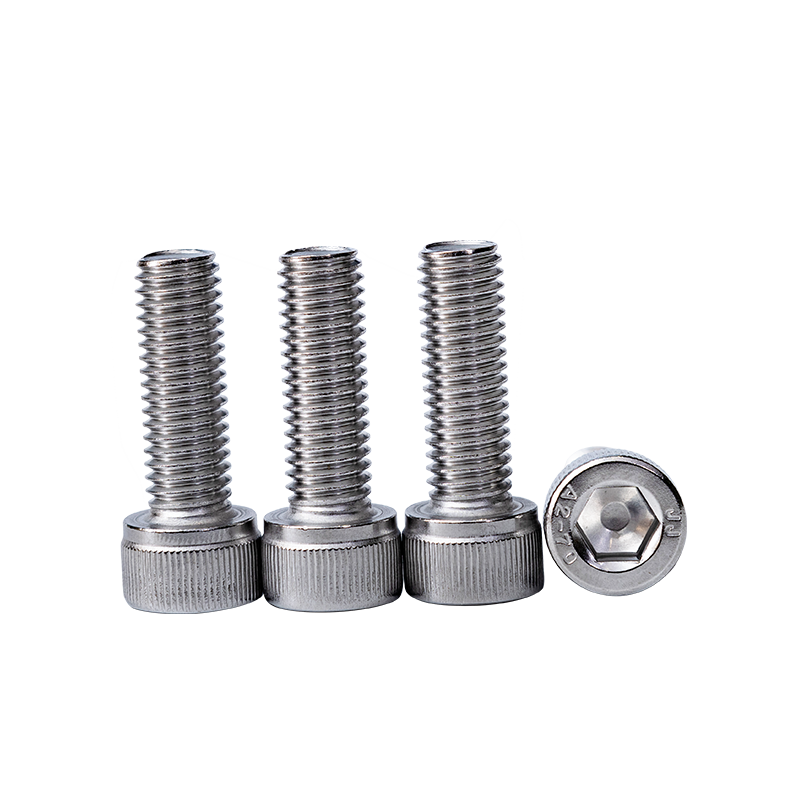Stainless steel Allen screws, also known as hex socket head cap screws, are commonly used in applications requiring strength, durability, and aesthetic appeal. One of their most valued characteristics is corrosion resistance, making them ideal for harsh environments. But how corrosion resistant are they, really? The answer depends on several factors, including the stainless steel grade, environmental conditions, and surface treatments.
1. Understanding Stainless Steel Composition
Stainless steel is not a single material but a family of iron-based alloys that contain a minimum of 10.5% chromium. This chromium content forms a thin, invisible layer of chromium oxide on the surface, known as the passive film. This film protects the metal underneath from corrosion and self-repairs when damaged, provided oxygen is present.
For Allen screws, the most commonly used stainless steel grades include:
A2 Stainless (Type 304): Good general corrosion resistance.
A4 Stainless (Type 316): Higher corrosion resistance, especially against chlorides and marine environments.
410 and 416 Stainless: Harder but less corrosion resistant, used more in mechanical applications than corrosion-critical ones.
2. How Do Stainless Steel Allen Screws Resist Corrosion?
The corrosion resistance of stainless steel Allen screws is primarily due to:
The Passive Film: As mentioned, the chromium oxide film acts as a barrier to moisture and air, slowing down or preventing rust formation.
Alloying Elements: Nickel, molybdenum, and nitrogen improve resistance. Type 316, for example, includes molybdenum for better performance in saltwater or acidic conditions.
Non-reactive Surface: Stainless steel does not easily react with many substances, including chemicals, oils, and mild acids, which makes it ideal for industrial, medical, and food-grade applications.
3. Comparing Corrosion Resistance by Grade
Here is how common stainless steel grades used in Allen screws stack up in terms of corrosion resistance:
A2-70 / 304 Stainless Steel: Offers solid resistance to most atmospheric conditions, food environments, and fresh water. However, it can pit or corrode in chloride-rich environments (e.g., saltwater or de-icing salts).
A4-80 / 316 Stainless Steel: Contains 2-3% molybdenum, offering superior resistance to chlorides, acids, and harsh chemicals. It is the preferred choice for marine and chemical processing environments.
410 Stainless Steel: Contains more carbon, making it harder and more machinable, but it sacrifices corrosion resistance, especially in humid or salty conditions. Not ideal for outdoor or corrosive settings.
4. Environmental Factors That Affect Corrosion Resistance
Even the best stainless steel can corrode under certain environmental conditions. Key factors include:
Salt Exposure: Especially in coastal or de-icing applications, where chloride ions break down the passive film.
Acidic Environments: Certain acids (e.g., hydrochloric acid) can aggressively attack the steel.
Temperature Extremes: High temperatures accelerate corrosion processes.
Lack of Oxygen: In enclosed or buried environments where oxygen is limited, the passive film may not regenerate, increasing corrosion risk.
5. Surface Finish and Treatments
The surface condition of the screw also influences corrosion resistance:
Polished or Passivated Finish: Improves resistance by removing surface contaminants and enhancing the chromium layer.
Electropolishing: An electrochemical treatment that smooths and cleans the surface for superior corrosion protection.
Coatings: Some stainless Allen screws come with protective coatings (e.g., black oxide) for extra protection and aesthetics. However, coatings may wear off over time.
6. Applications Where Corrosion Resistance Is Critical
Stainless steel Allen screws are used in environments where corrosion would compromise safety, hygiene, or appearance:
Marine Environments: Type 316 Allen screws are preferred for boats, docks, and offshore structures.
Medical Equipment: Requires corrosion resistance and biocompatibility.
Food and Beverage Equipment: Stainless screws resist corrosion from acids and are easy to sanitize.
Chemical Plants: Type 316 is again favored due to its resistance to aggressive chemicals.
7. How to Maximize Corrosion Resistance in Practice
To get the most corrosion resistance from stainless steel Allen screws:
Choose the Right Grade: Match the material to the environment. For marine or high-chloride applications, always go with A4 (316).
Avoid Cross Contamination: Use stainless tools during installation. Carbon steel tools can deposit particles that cause rust.
Maintain Cleanliness: Wash off salt or chemical buildup regularly.
Inspect Regularly: Look for signs of pitting or rust, especially in high-risk areas.
8. Limitations to Keep in Mind
While stainless steel is highly resistant to rust, it is not immune:
Pitting and Crevice Corrosion: Can occur in stagnant water or tight spaces where oxygen is limited.
Stress Corrosion Cracking: In chloride-rich environments under tension, some stainless alloys may crack.
Galvanic Corrosion: Happens when stainless screws are in contact with dissimilar metals in the presence of an electrolyte.
Stainless steel Allen screws are highly corrosion-resistant, particularly when made from grades like A2 (304) and A4 (316). They perform well in a wide range of environments, from household applications to demanding marine and chemical settings. However, their corrosion resistance is not absolute—it depends on proper material selection, environmental conditions, and maintenance practices. For optimal longevity and performance, choosing the right stainless grade and ensuring regular inspection is key.




 русский
русский Español
Español عربى
عربى italiano
italiano
 No. 2 Bridge, Chuangxin Road, Dainan Town, Xinghua City, Taizhou City, Jiangsu Province
No. 2 Bridge, Chuangxin Road, Dainan Town, Xinghua City, Taizhou City, Jiangsu Province  +86-17315333748(Wechat)
+86-17315333748(Wechat)
 +86-17315333748(Wechat/Whatsapp)
+86-17315333748(Wechat/Whatsapp)

